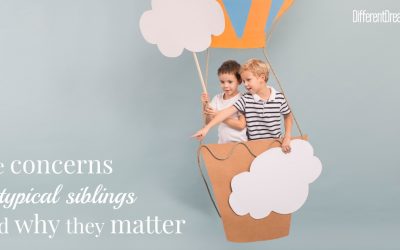7 Ways to Befriend Parents of Kids with Special Needs

Parenting kids with special needs is hard, isolating work. For those parents, supportive friends are worth their weight in gold. Gary Shulman, who has worked with special needs families for 24 years, is here with simple ways friends can make a real difference.
7 Ways to Befriend Parents of Kids with Special Needs
Who doesn’t want their child to have friends…to be popular, well liked, respected, invited to parties and play dates? Now put your feet into the shoes of a parent caring for a child with a disability. That neighbor, that friend, that community member has all the same wishes and dreams for their child whose daily challenges often make socialization and friendship difficult and scary. How can you support your neighbor who has a child in need of friends? Just remember the simple things you were probably taught by your parents and your best teachers:
Be Polite
Be polite and offer a warm and friendly hand. Chances are it will be grabbed with grateful delight.
Learn Appropriate Terminology
Sticks and stones can break my bones but words can devastate me. If you have a question about your neighbor’s child with a disability pertaining to that disability, it is kind and respectful to not use the disability to define who that child is. Children are not their disabilities. A disability is part of who a child is but so is a love of music, enjoying swimming, loving to be hugged, laughing at funny faces, and much, much more.
Avoid Stereotyping
Try to avoid stereotyping based upon preconceived notions pertaining to characters traits that have been attached to certain disabilities. Always look for the abilities, skills, interests, talents, and passions first.
Example: Oh, I see you have a Downs child. They are so cute and loving all the time.
Yikes! Always acknowledge the individual child first. You wouldn’t want your child to be referred to as “Look at that red-haired kid. Red-heads are always so freckled and temperamental!” Of course not.
Better: Hello, I am your neighbor Mrs. Jones. I have a little boy also. How old is your son? What’s his name. What does he enjoy? My son also loves to play in the water! I have a small rubber pool, how about setting up a play date? Pardon me for asking, but I notice that your son has Down Syndrome. May I ask you a few questions so I can learn a bit about how that affects him. I appreciate your educating me about this. I would love my son and yours to become friends. It seems that they have a lot in common.
Be a Good Friend
A good friend listens, is compassionate, offers information that helps, understands that there will be good and bad days, doesn’t constantly judge and asks how to offer help when it is needed.
Try to Understand
Understand that the life of caring for a child with a disability can be very exhausting. Think of how exhausting it is raising your child without special needs. Offering respite in the form of a play date will be so appreciated.
Be a Second Ear
Your neighbor will have to go to so many appointments pertaining to meeting the needs of her child with a disability. Ask if she would like you to accompany her. It can be very helpful to have a second objective ear to listen to what is being said. Depending on the nature of what is being discussed, you may or may not be able to listen to everything, but just being there can be so comforting.
Do Some Research
If you have the time, do some research about programs and services for your friend if she is too overwhelmed to do it herself. Always ask first. Sometimes parents don’t want to be bombarded with information until they ask for it or are ready for it.
Bottom line: A friend is a friend is a friend. You will find more in common with your neighbor who has a child with a disability than differences. Compassion, understanding, laughter, sharing time, and support are all the ingredients for establishing a warm and caring relationship with your neighbor who has a child with special needs. It’s the right thing to do and all benefit.
How Have Friends Supported You?
Do you have friends who’ve supported you? Give them a shout out in the comment box by telling what they did. Then be very brave send the link to this page to your friends who want to support you but don’t know where to start.
Do you like what you see at DifferentDream.com? You can receive more great content by subscribing to the quarterly Different Dream newsletter and signing up for the daily RSS feed delivered to your email inbox. You can sign up for the first in the pop-up box and the second at the bottom of this page.
Photo credit: www.freedigitalphotos.net

By Gary Shulman
Gary Shulman, MS. Ed. was the Program Director of Social Services, Training Coordinator and Special Camp Fair Coordinator for Resources for Children with Special Needs, Inc. for over 24 years. He recently transitioned from that position to the role of consultant/trainer on a private basis. Gary’s passion is bringing relief to families of children with disabilities as well as to the professionals who support them. His workshops are informational and inspirational. Through an interactive format, participants are taken on a journey of discovery. They learn about programs and services that make life easier when caring for a child with a disability and are motivated to think about their needs, wants, wishes and dreams and to move to realize them.
5 Comments
Submit a Comment
Subscribe for Updates from Jolene
Related Posts
Ten Moments in a Caregiving Life Well-Lived
The practice of noting ten minutes in a caregiving life can keep parents in the here and now instead of dwelling on what isn’t going well.
Concerns of Siblings of Children with Special Needs
The concerns of siblings of children with special needs can be easily overlooked. This post explains what parents should do instead.
Ways We Hold to Hope Through the Loss and Grief of Disabilities
The ways we hold to hope when grieving mature as our children become adults. Heather Johnson shares 5 ways she’s learned to hold to hope.






Please feel free to call upon me so you can utilize my years of expertise, training skills and passion for imparting valuable information, strategies and motivation to families and staff. It would be my pleasure to provide your families and staff with my services.
Gary Shulman, MS. Ed.
shulman.gary@yahoo.com
gary.shulman@nyc.rr.com
646-596-5642
Liz, I’m glad you liked the article and have friends who make time for your family. Like you said, we have lots of work to do so the general public doesn’t discount our kids or teach a new generation to do the same. Take care!
Wonderful article! I treasure the friends who make time for me and my son. I do wish that more of his peers’ parents understood how beneficial inclusiveness would be for ALL of the kids. No, my boy doesn’t care for soccer or basketball, but he’s a lot of fun to play video games with or to go swimming with. So many people are polite, but dismissive, and that makes me sad. They are unwittingly teaching their children that people who are different are not worth getting to know.
Those are wonderful friends. Can we clone those friends for others?
I have one friend who invites me and my daughter to brunch every 6-8 weeks. She offers a listening ear and unconditional love any time I need encouragement. I have another friend who texts me on a regular basis, invites my daughter to play dates/birthday parties, brings meals, visits us at the hospital and occasionally attends doctor’s appointments. She also offers unconditional love. Both of these friends pray for my family as well. I couldn’t make it without them. Much love to PJ and CG.